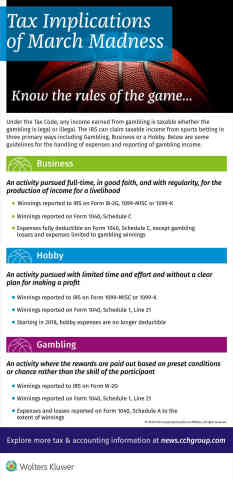TMCnet News
MEDIA ALERT: Don't Get Caught Off Guard by March Madness Tax ImplicationsWolters Kluwer Tax & Accounting: This press release features multimedia. View the full release here: https://www.businesswire.com/news/home/20190319005251/en/ 
Don't Get Caught Off Guard by March Madness Tax Implications (Graphic: Business Wire) What: It's March Madness time and office pool participants are studying the National Collegiate Athletic Association (NCAA) brackets, and daily fantasy sports players are putting together their baseball teams. Wolters Kluwer Tax & Accounting points out that, according to the Internal Revenue Service (IRS), betting activities could be considered gambling, business or a hobby - all of which is considered taxable income. The handling of expenses and the reporting of that income can be different and is another reason to reach out to a Tax professional. Why: Placing a bet in the NCAA bracket office pool is considered to be gambling, even though participants may claim some skill in selecting their bracket winners. Under the Tax Code, any income earned from gambling is taxable whether the gambling is legal or illegal. Under a US Supreme Court decision in 2018, all states are now permitted to offer sports gambling, and many have enacted or are starting to enact enabling legislation. This will make it easier to do legal sports betting and may also help the IRS track sports betting activity. Under the 2006 Unlawful Internet Gambling Enforcement Act, fantasy sports were determined to be a game of skill rather than gambling. As a game of skill, it is either a hobby or a business depending on the facts involved. Income from a hobby or business is also taxable. The IRS has not said officially that it agrees with that position and some states have taken the opposite position, viewing fantasy sports as gambling. If an individual can establish profits from the activity for three of the last five years or that the activity is engaged in as the primary source of income for the taxpayer on a full-time basis, the individual can be considered to be engaged in a trade or business. Who: Tax expert Mark Luscombe, JD, LL.M, CPA, Principal Federal Tax Analyst at Wolters Kluwer Tax & Accounting, can help sort through the various rules, requirements and reporting forms for gamblers, hobbyist or businesses, as well as the different ways in which expenses and losses are handled. Contact: To arrange interviews with Mark Luscombe or other federal and state tax experts from Wolters Kluwer Tax & Accounting on this or any other tax-related topics, please contact:
View source version on businesswire.com: https://www.businesswire.com/news/home/20190319005251/en/ |

